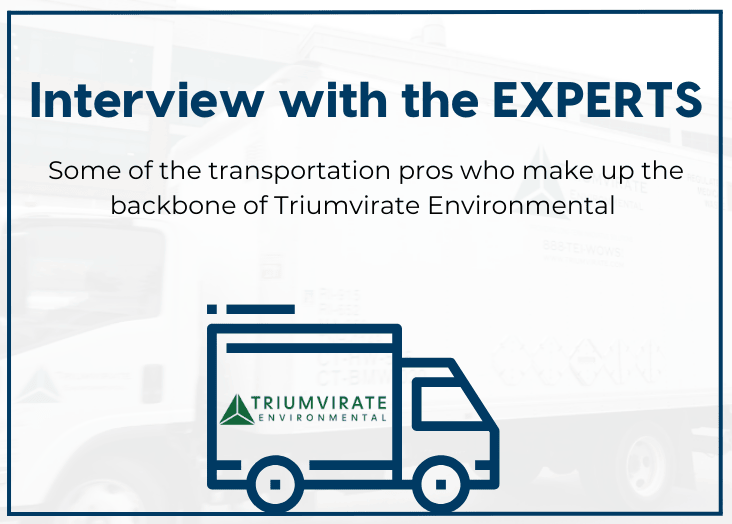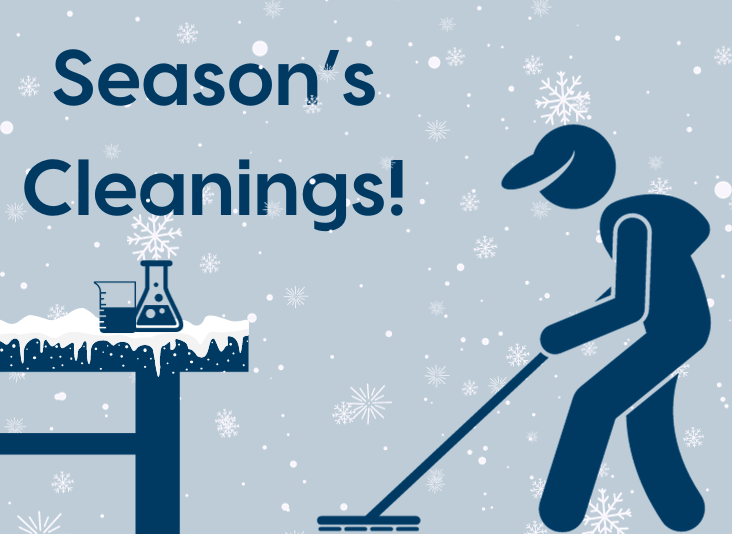A Look Into the Lives of Triumvirate Environmental Drivers
National Truck Driver Appreciation Week (NTDAW), a time to celebrate and acknowledge the hard work of drivers across the country, falls in early September each year. To commemorate this truck driver celebration, I sat down with a number of Triumvirate Environmental drivers to hear their thoughts on truck driving, both in the environmental, health, and safety (EHS) industry and in logistics in general.
Shawn Kubicke and Tim Aheimer are Triumvirate Environmental truck drivers based out of Jeannette, Pennsylvania. Roberto Sandoval drives Triumvirate Environmental trucks out of our Somerville, Massachusetts location. Thomas Norris is the Corporate Manager of Fleet Safety and Compliance at Triumvirate Environmental.
Throughout my conversations with these Triumvirate Environmental drivers, I gained a deeper appreciation for the work they do. They are the interface between the client and the business, are constantly vigilant of road safety and operations, and put themselves on the line every day they close their cab door. Without them, society as we know it would be deeply impacted. Each person I spoke with gave unique perspectives about the challenges and benefits of being a Triumvirate Environmental driver.
Q: What is your background, here as a Triumvirate Environmental truck driver and before joining the company?
Shawn Kubicke (SK): I have been driving for more than 17 years now, four of which have been with Triumvirate Environmental. I started driving with common carriers, then switched to the oil industry driving oil field equipment. After that, I drove for a local towing company and was home every night. Then I found Triumvirate Environmental. Out of all the driving jobs I’ve held, this is the one I like the most.
Tim Aheimer (TA): Before working at Triumvirate Environmental, I worked as a tile setter for two years. An injury forced me out of that field and into truck driving school where I got my commercial driver’s license. After graduation, I applied here; through the years, the local position in which I started turned into an over-the-road (OTR) position, and I now work for our BestPLUS division as a flatbed long-haul driver.
Roberto Sandoval (RS): I am a Mexican-American originally from Compton, California. In 2019, I moved to Massachusetts and began working with Triumvirate Environmental. It has been 4 years and 7 months—and counting! I’m currently a CDL, Class A driver here.
Thomas Norris (TN): My whole career has been in the EHS field, most notably in the safety area. I recently joined Triumvirate Environmental, but previously I was working with a hazardous material hauler in the energy sector.


Q: Why are truck drivers so important to the world? To EHS?
SK: If truck drivers got off the roads, the whole nation would shut down. This became extremely obvious during the height of the COVID pandemic when truckers were practically the only ones on the highway. We do have many regulations to follow, which can be challenging, but those regulations help keep the road safe and the environment healthy. In the end, truck drivers enable proper waste management, and I know these hazmat materials I’m hauling aren’t getting dumped in the ocean or poured down a deep hole somewhere. Rules exist so the roads are safe for everyone, and we play a crucial role in truck checks that make sure we are as safe as possible out there.
In part, we also become the face of the company we work for, and need to take pride in how we behave—doing our job professionally and being courteous to other drivers and our clients.
TA: America can’t function without trucks delivering our goods—everyone knows that. Triumvirate Environmental is unique in terms of how our transportation team and truck drivers play an important part in helping keep plastic waste out of landfills by recycling it into durable plastic lumber, a quality American-made product that lasts.
RS: More than 80% of Americans depend on truck drivers for deliveries—truck drivers are essential because they deliver important resources and goods to different places.
TN: Truck drivers provide a crucial service. They are the key component we rely on to deliver goods and services across the country. Without them, we would not have products to purchase nor a way to deliver vital services to clients. Our drivers are the backbone—they let us go to market safely, putting themselves on the line to face road hazards including inclement weather, traffic congestion, and time alone away from home.

Q: What is the most rewarding thing about a Triumvirate Environmental truck driver career?
SK: COVID lockdowns helped people understand the importance of truck driving—because our nation would shut down without people willing to drive trucks. The most rewarding thing is this appreciation and respect for this position, both by society and within Triumvirate Environmental. I love working in a flexible position and making long-lasting personal and business relationships with the Environmental Specialists (ESs) and clients on the accounts I service. These friendships—because that’s what they are, friendships—help keep the business relationship strong but also make the job rewarding and fun.
TA: I’ve found that there is an amazing support system among drivers. This close-knit family of drivers helps and supports each other through challenging tasks and hard days, especially in our flatbed division. Knowing I can help another driver with a problem or teach them something is extremely rewarding.
RS: I love truck driving because I am able to travel to different places I have never been to before. Since I started working here, I have traveled to all New England states.
TN: I am not a truck driver, but in my opinion, throughout logistics overall, there is a great deal of pride. It is rewarding to see the pride that our Triumvirate Environmental drivers have in delivering and managing logistics. I was excited this past week to celebrate these “unsung heroes” of the EHS industry, the workers who are alone a lot during the day on the road, who help make operations possible.
Q: What is the hardest part about being a truck driver?
SK: Being away from home and family; missing kids’ birthdays, graduations, and when people are sick. When out there on the road, you don’t have the luxury of being able to jump in if loved ones are ill or need help, and you often miss important milestones because you have to drive 500 to almost 700 miles a day. The key is to find a position in which the company actually cares about you, where you’re not just a number in a seat, another person out on the road. I’m fortunate to have found a company that cares about family values and quality time; if you don’t have that support, being a truck driver can be incredibly stressful.
TA: Time spent away from home and family. In my opinion, it takes a special person to be able to have longevity in truck driving because of that reason. Knowing I’m making a difference in keeping plastic waste out of landfills, however, motivates me to overlook the negatives and focus on the positives of truck driving.
RS: I’ll echo what everyone else has said—one of the hardest things about being a truck driver is being away from family for long periods of time when I’m on long trips or when I come home really late.
Q: What was your best day on the job?
SK: Honestly, there have been a lot of them. I am thankful every day for the freedoms this job provides. Every day is rewarding in one way or another—even if just when you get a “How ya doin?” or “We appreciate ya,” we get the reward of knowing that customers, co-workers, and clients are happy and that our family can be happy as well.
TA: Once, a fellow driver was hauling equipment out of Illinois and didn’t have any tarps or the knowledge to tarp a load. We were only 100 miles apart on the same interstate highway, and as luck would have it, I had three tarps on my flatbed that day. I stopped early and showed the driver how to properly tarp a load. For me, helping the driver and showing him how to tarp was rewarding—and even though we worked long into the hot summer night with nothing but flashlights, it was by far one of the best experiences I’ve had while working here.
RS: I felt really validated for all my hard work when I was awarded the “Driver of the Year” award for my performance. That was one of the best days on the job for me.
Interested in becoming a Triumvirate Environmental driver? See Triumvirate Environmental job openings here.

Q: What are some common misconceptions people may have about truck driving in the EHS industry or in general?
RS: One major misconception people have is that truck drivers are unskilled workers. In reality, truck driving requires a highly specialized set of skills—including being aware of road hazards, conducting pre- and post-trip safety inspections, learning how to navigate in different states, and being knowledgeable about regulations and safety procedures, to name just a few.
TA: A lot of people think that truck driving is “easy money.” Truck driving isn’t easy! It’s long days and it takes a lot of dedication. You have to coordinate with customers, inspect your equipment multiple times a day to ensure safety, and plan routes. You can’t just turn the key and go down the road—there’s a lot that goes into it.
TN: Many people drive and operate as if a tractor trailer can stop on a dime at any speed—this simply is not true. With load weights often reaching almost 80,000 pounds, it takes great time and distance to reduce speed and stop a truck. A fully loaded truck, at 60 miles per hour, takes more than a football field to stop.
Drivers are always alert to maintaining a safe following distance from the vehicle in front of them so they have room to stop if need be. This is ideally 4 seconds in good weather. Cutting trucks off, or merging and slamming the brakes, does not provide trucks the room to maneuver and is extremely unsafe.
Q: What is something not many people know about truck driving, in the EHS industry or in general?
SK: We need to be in prime form to do this job—be well rested, know what we are doing, understand how we are going to get where we need to be. We need to constantly be vigilant to keep ourselves and other people on the road—families, commuters, and other truck drivers—safe.
TA: It’s rewarding work, but it’s also difficult. Transportation is one of the most regulated industries in the United States—we deal with Department of Transportation (DOT) regulations, DOT officers and inspectors, and poorly maintained roadside facilities like truck stops to stop at for the night. Not to mention there aren’t enough places for truck parking—for every 10 trucks on the road, there’s only one available parking spot.
People also don’t realize that trucks are crucial for supplying vital industries like hospitals—and these places rely on Triumvirate Environmental (and Triumvirate Environmental drivers) to keep them in compliance and remove their waste.
RS: Driving in the EHS industry specifically requires a lot of training and a vast wealth of knowledge about safety, DOT regulations, hazardous waste, and more.
TN: A few interesting facts: Of the 3.5 million drivers in the United States, only 9.5% are women. Their average age is 46 years old. Most truck drivers come from Texas.

Take time to thank a truck driver today—without them, life as we know it would not be possible. Interested in being a Triumvirate Environmental driver? View our open Triumvirate Environmental truck driver careers.





.png?width=768&height=1024&name=MicrosoftTeams-image%20(17).png)


